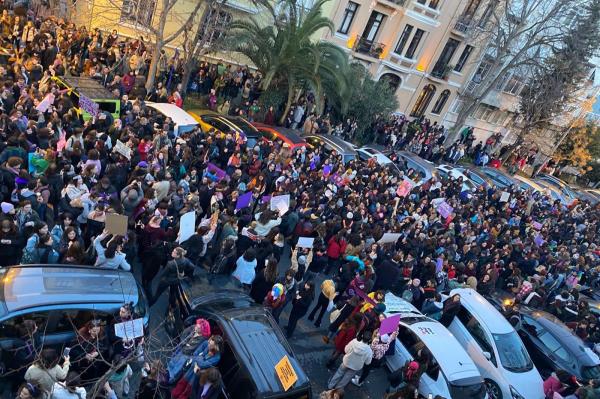On 8 March this year, women who do not give up their struggle for their rights and freedom have risen their voice against patriarchy, inequality and discrimination all over the world.

March 8 became a day of struggle for women on 8 March 1857, when 129 workers died in a fire that broke out during a strike by 40,000 women weaving workers in New York demanding better working conditions and equal pay for equal work. In 1921, the International Women’s Secretariat declared 8 March as ‘International Women’s Day.’
For more than 100 years, March 8 has not been a celebration but a day women demand their rights and protest the violence, discrimination and inequality they are subjected to.
In a statement issued on March 8, the United Nations emphasised that gender equality is “300 years away” and that hard-won gains are gradually being lost.
“Women’s rights are being abused, threatened, and violated around the world,” United Nations Secretary General António Guterres said, naming a few countries in particular, including Afghanistan, where he said “women and girls have been erased from public life.”
Women are the ‘voice of rebellion‘
After a year in which anti-gender movements gained strength all over the world, women and girls were banned from social life in Afghanistan, mass uprisings for women’s rights erupted in Iran and the women lost their constitutional right to abortion in the USA, women took to the streets all over the world for March 8 events and became the voice of rebellion.
In Turkey, before the 8 March Istanbul Feminist Night March, all streets leading to Istiklal Street in Beyoğlu, were closed with a ban order from the Beyoğlu District Governorate, but women ignored the ban and gathered around Taksim. Women shouting “We are angry, we are mourning but we are in rebellion!” were subjected to police intervention with pepper gas.

In Afghanistan, women took to the streets in small groups in different provinces on 8 March, demanding the right to study, work and freely go out on the streets, despite the Taliban’s oppression.
In Iran, different women’s organisations, workers’ committees and unions, student councils, neighbourhood committees called for women to take to the streets on March 8.

Iranian women took to the streets with slogans and banners such as “Women, life, freedom”, “We are in revolt against misogyny”, “Stop executions immediately”. In different cities of Iran such as Tehran, Rasht and Saqqez, several slogans such as “With or without headscarves, let’s go towards the revolution” were raised.
March 8 rallies and demonstrations in France this year were combined with actions of pensioners against the Macron government, strikes by teachers, public transport workers and other workers. In addition to economic demands, women took to the streets demanding an equal and free life. They marched with banners supporting the strikes. In the demonstrations where the struggle and demands of Iranian women were made visible, attention was drawn to the international struggle.

In Greece, protests demanding accountability of those responsible for the train tragedy in which 57 people lost their lives turned into a general strike.
In many states of Germany, all-day strikes have begun in kindergartens and social services. The Ver.di trade union announced that it wanted to increase pressure on the federal government and local authorities. Numerous rallies also took place throughout the day in different cities, including Stuttgart, Hanover, Bremen, Dresden and Hamburg.

In Melbourne, demonstrators demanded equal pay for women and more effective security. They raised the demand for “safe, dignified, equal.”
In London, protesters marched to the Iranian embassy in costumes inspired by Margaret Atwood’s novel “The Handmaid’s Tale” in support of women in Iran.
Protesters in several cities of Spain, including Madrid and Barcelona, organised separate rallies for International Women’s Day in response to divisions within the feminist movement over transgender rights and prohibition.

In Oslo, with the participation of 10 thousand people, the issues of abortion, women’s health, the demand for full and permanent staff and violence were made visible. The main slogan of the event was “Jin, Jiyan, Azadi – Kvinne- Liv -Frihet” chanted in Kurdish and Norwegian to support the women’s struggle in Iran.
Sources: Bianet, Ekmek ve Gül, BBC

